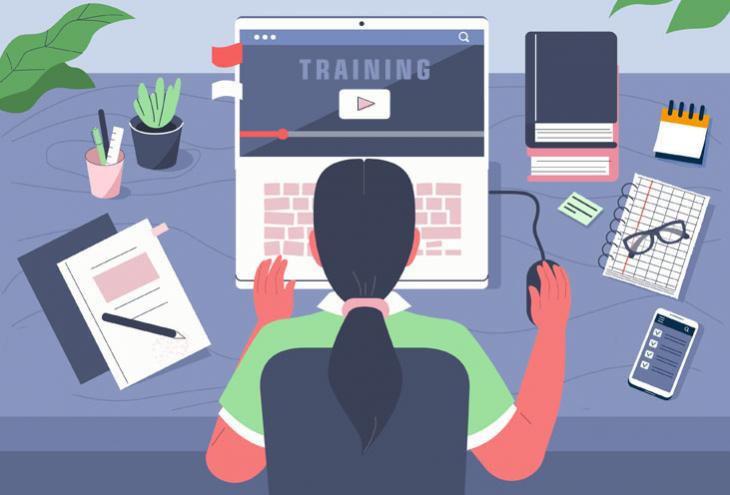As we step into a new normal, there’s one aspect of our pandemic lives we won’t be leaving behind: technology. Digital platforms and tools are more important than ever to businesses and organizations. Employers are increasingly looking for — and promoting — people who understand the full potential of technology to accelerate workplace success.
How tech savvy are you, and how can you build on that skill set? Here are some steps to get you started.
Assess where you are. After more than a year of relying heavily on technology, we’re all more digitally literate than we used to be. But is it enough? If you look beyond your strengths, you can identify opportunities for growth. Are you great with spreadsheets and Google Workspace but awkward with social media? Are you a whiz at search engine optimization, but find yourself lost on Microsoft Teams? Maybe you feel tech confident, but know it would help if you could add a specific skill like coding.
Think of the “Three Cs” — Confidence, Communication, Collaboration. What added or improved tech ability would increase your confidence at work, elevate how you communicate, and enhance how you collaborate? Now is your time to bridge any gaps. Fluency with a variety of communication platforms is a key asset in any job, even if others don’t know where your tech capabilities currently lag. “By communicating professionally, no matter what technology you’re using, you will impress the employer with your skills,” says Alison Doyle, career advisor and founder of CareerToolBelt.com.
Find your “school(s)” and learn at your own pace. If you’re an avid reader, you can get started with a “how to” guide on your topic. If you have the time and resources to enroll in a class at a community college or public library, that could be your ticket. If time is limited and you need to take smaller steps, there’s a world of instructional videos on YouTube and resources such as LinkedIn Learning and Google Digital Garage. You can also find free and lower-priced courses on sites like Codeacademy, Udemy, Coursera, and Alison.
Everyone learns differently and has competing demands. It’s important to approach learning in a way that feels manageable. Most online courses are designed to be taken incrementally as you have time to focus and engage. Try to take a little time after each class session to incorporate what you just learned into the way you work. Noticing signs of progress as you go will motivate you to continue building your skill set.
Practice and use digital intelligence. As you apply your new talents, your confidence and competence will grow. If you’re working on your social media agility, interact on social media a little every day. If you’re learning the basics of code, develop a simple game or app. Or if your current challenge is mastering Google Workspace, enlist your family in keeping track of chores and appointments in a household Google spreadsheet.
As you use more of your new skills at work, be aware of which tools you use and why— especially if you’re in a hybrid workplace. Technology expert Sam Marshall calls this using “digital intelligence” to pick up and send cues. When collaborating remotely, he advises, know “when a curt typed message is best responded to by a video call.” Or if you’re in the office, ditch the Teams chat and walk over to the person’s desk for a face-to-face conversation. He also encourages upping your tech game in smaller ways your colleagues will appreciate, like more concise emails that are easier to read on a mobile device.
Keep your knowledge updated. It could be helpful to subscribe to an RSS feed app like Feedly, where you can select your tech topics of interest and get regular updates and tips. Even if you don’t have an active presence on social media, consider establishing a Twitter account where you follow organizations and experts with information and advances that can help you excel at work. As Doyle points out, it’s an easy way to stay updated on news relevant to your career, and “employers increasingly look for employees with basic social media literacy.”
In your tech-savvy future, you can look forward to a variety of professional benefits. As you stay on your learning path, you will continue to update your skills and find new ways to contribute at work. Your employer and peers will respect and appreciate your progress, and you will discover you have created your own momentum. In short, there’s no stopping you now.
On Topic
James McGaa, Oglala Lakota, is a software engineer at the intersection of Facebook and Instagram Stories. He is an alumnus of MIT’s AISES College Chapter.
Technology is the key to opportunity and impact in the modern age. It’s the interdisciplinary, universal currency used to push the boundaries of all fields and create prosperity within modern society. Technology leverages the power of modern computation to enable us to perform work well beyond the capabilities of an individual. Importantly, technology advances regardless of how well we keep up with it; we must keep in step with technology lest it, and its myriad opportunities and benefits, leave us behind.
Generally speaking, which programs are most professionals expected to have a working knowledge of?
The meta of popular programming languages shifts each year. However, the trifecta of Python, Javascript, and C++ remains a popular choice for a well-grounded background in computer science. Beyond programming, familiarity with the command line is universally useful in tech. Finally, knowledge of both SQL and NoSQL databases is indispensable in tech, data science, and business analytics. For a more detailed survey into popular technologies, I’d recommend the Stack Overflow Developer Survey.
What are three ways the average person can stay current with software and apps?
Tech-focused journalism is the best way to stay up to date on current trends in tech without diving into the details. A few quality examples include The Verge, TechCrunch, and ArsTechnica. Another way is to follow tech communities on social media, such as reddit’s r/technology. Finally, platforms such as Udemy, Udacity, and Coursera have many affordable, accessible courses with little -to -no formal prerequisites. These courses can serve as great introductions to various studies in software engineering, security, data science, and analytics, among others.
How and how often should professionals assess their technology literacy?
The tech industry is among the most dynamic in the world. The popularity of languages, frameworks, and communities shifts rapidly in response to advances in both hardware and software. Ideally, as professionals we should assess and advance our technology literacy quarterly to balance both frequency and depth. Hacker News is a popular source of current events and technological advancement through the lens of tech. Reddit remains the community forum of choice for much of the tech community, with subreddits such as r/technology and r/programming being popular places to keep up to date in a more casual format. Finally, many industry leaders host tech blogs, which provide highly transparent views into the systems that power many of the applications we use daily. I highly recommend the engineering blogs of Facebook, Netflix, Dropbox, and Uber to keep up with industry trends.
What resources can people access when learning new technology?
AISES is perhaps the greatest resource in learning tech, serving both as a supportive community and a source of professional connections. To learn how Facebook designs systems at scale visit us at engineering.fb.com
Some resources I found highly helpful in my career are as follows.
For Beginners: Coursera, Codecademy, Khan Academy
For Intermediates: MIT OpenCourseWare, Stanford Engineering Everywhere, Stack Overflow For Professionals: Architecture of Open Source Applications, Engineering Blogs
For Students: GitHub Student Developer Pack














